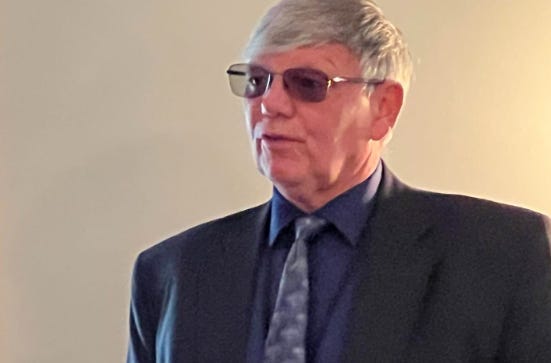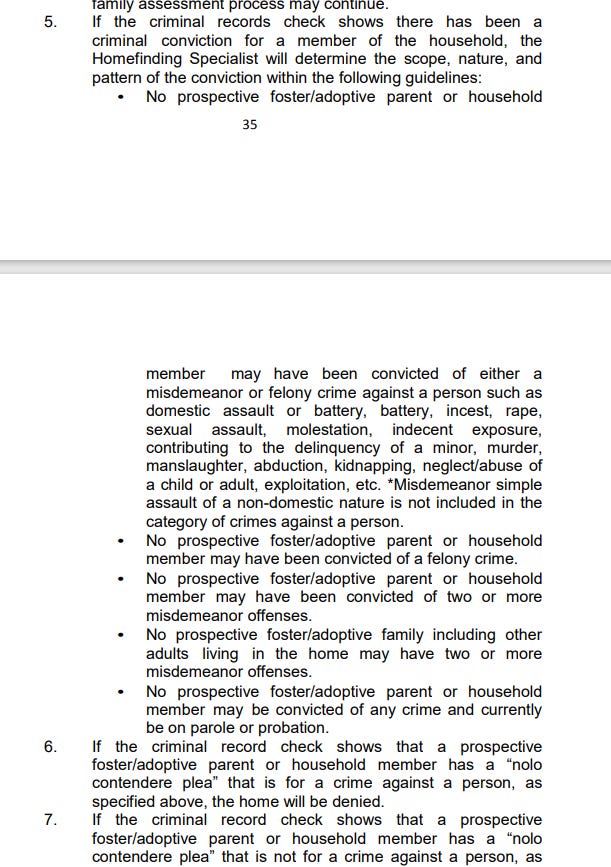Not all orders are created equal in Judge Shaffer's courtroom
A remarkable set of hearings show how haphazardly this West Virginia judge treats his cases.
In September of 2023, I brought the story of Michael Bean, who had his parental rights terminated in West Virginia.
Judge Steven Shaffer terminated his rights. It was a case that looked strong on the surface, but it was paper thin upon close examination. The decision relied heavily upon two children who weren’t credible.
This was one of several problems with Judge Shaffer’s decision.
Two hearings- the 14th and the 19th of June 2019- show just how haphazardly Judge Shaffer made his decisions. On June 19, 2019, Judge Shaffer made the following pronouncement.
One of the questions that Judge Shaffer said he always asked was, “Does the petitioner have a record of any misdemeanor or felony convictions?’
In fact, Bean spent six months in jail for a drug conviction, and Judge Shaffer made a big deal out of this incarceration and how it played into the termination of parental rights. Here is part of my previous article.
Furthermore, rules from the West Virginia Department of Health and Human Resources (DHHR), which oversees foster care, clearly state that no foster parent can have a felony conviction.
The rules are clear. No one with a criminal conviction for domestic violence shall be approved to be a foster parent… except when Judge Shaffer skirts the rules, like in Bean’s case.
When Judge Shaffer asked his questions rhetorically, he already knew the answer. That’s because five days prior- on June 14, 2019- he and several court participants discussed the prior criminal conviction of one of the foster parents.
Ms. Armstrong is Anne Armstrong, from the Preston County Prosecutor’s Office. I reached out to Ms. Armstrong, but another staffer informed me that she would not comment because the case was considered confidential.
Armstrong’s main argument was that the conviction was old news. The conviction occurred in 2004. I asked Michael Bean to respond to this.
Bean told me that there are laws, those laws should have been followed, but Judge Shaffer ignored them and placed those children with a convicted domestic batterer.
Armstrong was not the only who wanted to bend the rules for the foster parents. Maria Borror was assigned as the guardian ad litem (GAL) on the case. Here is part of her testimony.
I reached out to Ms. Borror by phone at her office, but she did not respond to my voicemail.
One key part of her testimony is, “but I've been thinking about it, and we're in these types of cases because we're giving families second chances. We give parents second chances when they make mistakes.”
She is not referring to anyone’s biological parent, but to a foster parent. Ms. Borror is keen on giving foster parents second chances: what about the biological parents.
Michael Bean lost his parental rights mainly because he spent six months in jail: where was his second chance.
Lance Rollo, Bean’s attorney, made the same point.
“What I will say is that I would hope that the folks that want to overrule the Department policy and give people second chances have that same kind of attitude when we're dealing with these three folks right over here. I think it's something that we really need to keep in mind, because I think the attitude with respect to Mr. Nedrow -- Mr. Nedrow, I'm sure you're a fine individual and I'm not disparaging your character whatsoever, but I think the attitude for this gentleman is polar opposite to the attitude towards these three {referring to the three biological parents involved}.”
In this case, Bean’s ex-girlfriend was taking care of his daughter and two sons with another man. The case was combined with all three parents.
The two boys from Bean’s ex-girlfriend with the other man were in this foster home, where the convicted criminal also resided.
I asked Bean how he felt about the department giving a foster parent a second chance but not him.
He told me that not only did he, the biological father, not get a second chance, he never got a first chance.
Rollo previously declined to comment, citing the same confidentiality policy.
The problem in this foster home wasn’t merely that one adult had a previous criminal conviction.
The home failed multiple home studies.
Judge Shaffer ignored this as well, and he continued keeping them in the home.
I asked Bean about this.
The reason Armstrong and other wanted to skirt the rules came down to two words: thriving and stability. The children were thriving, and the home provided stability. according to Armstrong.
I asked Bean about this argument.
Bean said it was not true that the boys were thriving in this foster home. Through relatives and friends of friends, he told me that he learned that they have continued to act out and gotten into trouble.
Finally, I also reached out to Kristen Antolini. I initially mistakenly believed that she was the GAL, but she represented the other father. She did not object to the placement during the hearing.
She was fine with her client’s biological children living with a convicted felon who couldn’t pass a home study.
I asked Ms. Antolini about this, and here is her response.
“These cases are confidential, and per West Virginia Code, I am not authorized to speak about the cases. Nonetheless, I am not the Guardian ad Litem in this matter, and I would ask that you not refer to me as such in this matter. I kindly request that you not contact me moving forward.”
I won’t contact Ms. Antolini any more about this story- after I send her a link- but this is not the last time we’ll speak.
By law, child protective services (CPS) cases in West Virginia are non-transparent.
West Virginia has created a star chamber in CPS cases, and that’s wrong.
We have open courtrooms in America, and that should extend to CPS cases as well.
{Check out my story on Heather Boger, where caseworkers violate their own confidentiality policy with impunity.}
Finally, the hearings were to decide the placement of two children who weren’t Bean’s children- they are his daughter’s half siblings- so I asked him how this placement affected his daughter’s placement.















"A case looked strong on the surface, but it was paper thin upon close examination" story of all my cases, Judges leaving out pertinent facts to support their bogus ruling, almost always
So is this how they decide to place all children in guardianship and adoption cases in west virginia PLEASE SHARREE EVERY WHERE ...wonder what the full story is about Sissonville would love to see scripts on removal of children and about the placement of those children